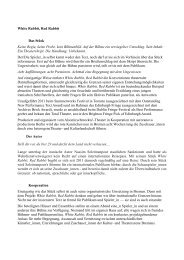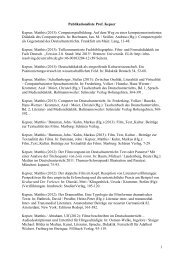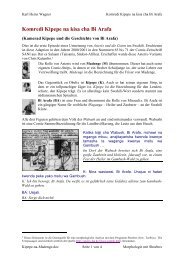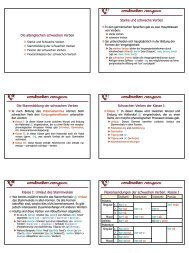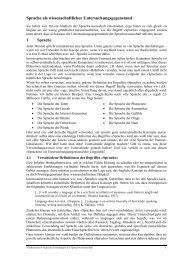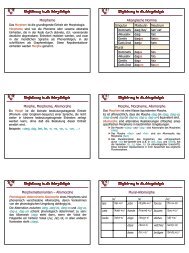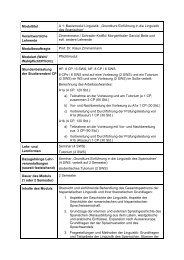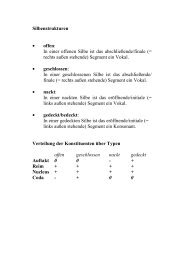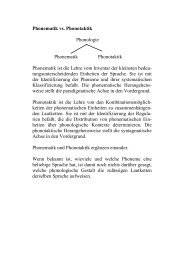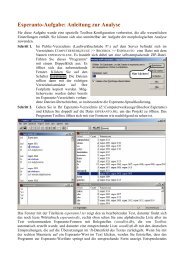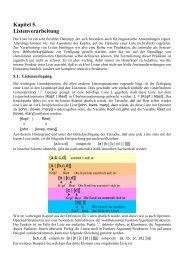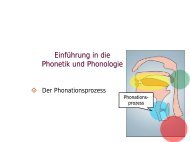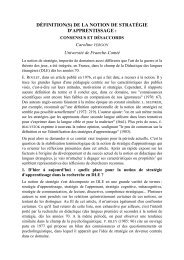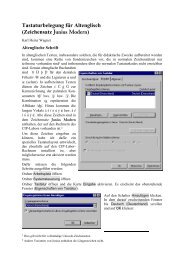Relativism and Universalism in Linguistics - Fachbereich 10 ...
Relativism and Universalism in Linguistics - Fachbereich 10 ...
Relativism and Universalism in Linguistics - Fachbereich 10 ...
Create successful ePaper yourself
Turn your PDF publications into a flip-book with our unique Google optimized e-Paper software.
138 Workshops<br />
References<br />
Abraham, W. 2005. Event arguments <strong>and</strong> modal verbs. C. Maienborn & A Wöllste<strong>in</strong> (eds.).<br />
Event arguments: foundations <strong>and</strong> applications, 243-276. Tüb<strong>in</strong>gen: Niemeyer.<br />
Borsley, R. <strong>and</strong> J. Kornfilt (2000). Mixed <strong>and</strong> Extended Projections. In: R. Borsley (ed.) The<br />
Nature <strong>and</strong> Function of Syntactic Categories; Syntax <strong>and</strong> Semantics 32, <strong>10</strong>1-131. San<br />
Diego: Academic Press.<br />
Hopper, P.J. <strong>and</strong> S.A. Thompson. (1980). Transitivity <strong>in</strong> Grammar <strong>and</strong> Discourse. Language<br />
56, 251-299.<br />
Malchukov, A. 2004. Nom<strong>in</strong>alization/verbalization: constra<strong>in</strong><strong>in</strong>g a typology of transcategorial<br />
operations. München: L<strong>in</strong>com.<br />
Aspect <strong>and</strong> modality <strong>in</strong> the Japanese verbal system<br />
Narrog, Heiko<br />
Tohoku U, Japan<br />
narrog@gmail.com<br />
Japanese is a language which throughout her documented history has had a rich system of<br />
grammatical aspect <strong>and</strong> modality, but no overt mark<strong>in</strong>g of lexical aspect. Furthermore, while<br />
<strong>in</strong> Old Japanese some modal markers were conspicuously polyfunctional, <strong>in</strong> the modern<br />
language the expression of deontic <strong>and</strong> epistemic modalities is strictly separate.<br />
In this paper, I wish to present an overview of the <strong>in</strong>teraction of aspect <strong>and</strong> modality <strong>in</strong> the<br />
Modern Japanese verbal system, with an excursion <strong>in</strong>to diachrony. I will show that <strong>in</strong> this<br />
language (1) all types of modality are <strong>in</strong>dependent of grammatical aspect, that is, are basegenerated<br />
<strong>in</strong> different structural positions; (2) both deontic <strong>and</strong> epistemic modality are basegenerated<br />
at higher positions than aspectual positions; (3) there are at least two positions at<br />
which modal markers are generated, one lower than T (MP1), <strong>and</strong> one higher than T (MP2).<br />
The former <strong>in</strong>cludes expressions of all types of modality (deontic, epistemic, evidential,<br />
volitional), <strong>and</strong> both suffixes <strong>and</strong> periphrastic cnstructions, while the latter only <strong>in</strong>cludes<br />
expressions of epistemic <strong>and</strong> evidential modality which are morphologically suffixes (In<br />
agglut<strong>in</strong>ative Japanese, suffixes <strong>and</strong> periphrastic constructions correspond to modal verbs <strong>in</strong><br />
Germanic languages. Adverbs are excluded from the considerations here). That is, the<br />
categories of the IP mentioned here st<strong>and</strong> <strong>in</strong> the follow<strong>in</strong>g relationship to each other:<br />
[MP2[TP[MP1[ASPP [(vP)]]]]]. Now, crucially, both deontic <strong>and</strong> epistemic modalities are basically<br />
unrestricted <strong>in</strong> their <strong>in</strong>teraction with perfective <strong>and</strong> imperfective aspectuality asillustrated <strong>in</strong><br />
the follow<strong>in</strong>g examples, (1)-(4):<br />
1. Perfective ASP + deontic M:<br />
Kimi-wa [TP [MP1 [ASPP [sore-o haya-ku wasure]te simaw]anakerebanarana] i]<br />
you-TOP that-ACC quick-ADVforget-GERPRF DEO -NPST<br />
‘You must forget that quickly’ (deontic)<br />
2. Perfective ASP + epistemic M:<br />
Kimi-wa [MP2 [TP [ASPP [ sore-o haya-ku wasure]te sima(w)] u]daroo]<br />
you-TOP that-ACC quick-ADV forget-GER PRF-NPST EPI<br />
‘You’ll surely forget that quickly’ (epistemic)



